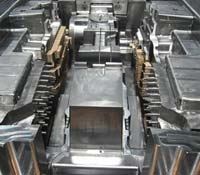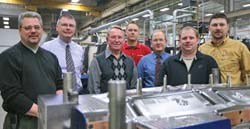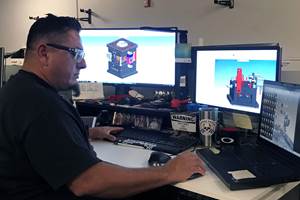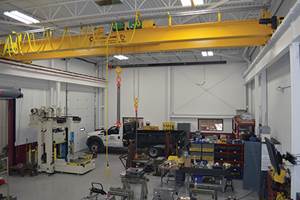Commercial Tool & Die: Innovation And Improvement Are Keys to Success
The company’s two mantras—customer service coupled with continuous improvement—have allowed this mold manufacturer to triumph during trying times while landing them the MoldMaking Technology 2009 Leadtime Leader Award: Large Shop for the second year in a row.
Since being named last year’s Lead-time Leader winner, Commercial Tool & Die, Inc. (CTD, Comstock Park, MI) has not been content to rest on its laurels while enjoying this honor. On the contrary—despite the fact that times are tough in the state of Michigan due to the troubled auto industry and the overall economy—CTD has managed to keep its sales consistent through the continued production of high quality plastic injection molds primarily for the appliance, furniture and automotive industries with an emphasis on high quality customer service and continuous improvement initiatives.
CTD combines employee innovation with the latest, greatest technology and equipment to also design, manufacture and maintain gas-assist, compression, two-shot injection, and plastic injection molds. Examples of the company’s latest innovations/initiatives include:
- Integrating its design software with its accounting and purchasing processes,
- Utilizing feature-based recognition to automate CAM programs
- Improving equipment utilization through machine monitoring software
- Utilizing a one-of-a-kind, in-house apprenticeship program (CTU) certified by the United States Department of Labor
- Deploying a team approach and problem-solving concepts throughout the organization
According to CTD Vice President Todd Finley, the company’s average leadtime for all projects, regardless of size and complexity, is 11.9 weeks. The tool featured on the front cover is a prime example of Commercial Tool’s capability. Two of these large and complex molds were designed and built in less than 12 weeks, from sales order to first shot, over the Christmas and New Year holidays.
CTD uses a concurrent design, engineering, and manufacturing approach to produce large and complex molds. “Staged releases of data are coordinated with manufacturing processes and purchasing of materials and components align with the manufacturing schedule,” says Plant Manager Dave Ketelaar. “Regardless of size and complexity, jobs are coordinated to ensure resources such as steel, data, perishable tooling, components, machines, and personnel are all available when needed.”
Business Acumen
“The business philosophies of continuous improvement, customer service and improved efficiencies are part of our culture,” notes CTD CEO Doug Bouwman. “This culture is sustained through our focus on our organization’s vision and adherence to our core values, which include a strong commitment to integrity and doing the right thing for customers, employees, business partners and neighbors.”
These business strategies resulted in the company gaining “at least three new major customers totaling $5 million in sales,” according to Finley. These new customers came from the automotive industry.
Poised for Growth
CTD has set several short- and long-term goals. “Since we are currently registered to ISO9001:2000, we are watchful for opportunities to continually improve and upgrade our quality management system,” emphasizes Director of Quality Don Brecken. “We plan to continue our focus on identifying best practices, developing production standards and skills training.” To that end, CTD formed an in-house training program called Commercial Tool University (CTU) (see below).
CTD also is pursuing work in different regions—including the Southeast U.S.—adds CTD VP of Engineering Ray Henkel. “We have a strong core competency in high-speed machining and we have some extra capacity, which we have been filling with contract machining for other mold shops that have a need,” Henkel comments.
The ability to constantly reinvent itself through continuous improvement with new technology, ideas and training is what has sustained CTD through difficult times and makes this company optimistic about the future. “New technology, training and exposure to what will be available tomorrow fosters new ideas for today and future planning for implementation in the coming months and years,” CTD Design Manager Mike Monje concludes. “We are never fully satisfied with the way things are and always look for opportunities to improve.”
|
Commercial Tool University (CTU) Offers Unique Apprenticeship Program
|
|
To train its employees, Commercial Tool & Die started a unique in-house training program called Commercial Tool University (CTU). “This one-of-a-kind apprenticeship program is certified by the U.S. Department of Labor,” notes Training Coordinator Ryan Pohl. “All course work takes place in-house and our own equipment is used to perform instruction. “It is not merely an apprenticeship program, but a holistic strategy designed to support a learning culture that strives for continuous improvement,” Pohl continues. “CTU has designed specific training modules for each work area in the shop. These structured training modules helped reduce one-on-one training times by as much as 75 percent in many cases. CTU is meeting numerous needs, says Director of Quality Don Brecken, “including the knowledge and skill development of current employees, helping employees to perform efficiently, and supporting the learning culture at CTD. This strategy also provides long-term benefits. With the growing labor crisis, CTU will provide a way to take a person who has limited or no experience in machining and tooling and put them on a planned program of development until they are skilled craftsman, which is needed for success in this trade.” |
![]()
Related Content
Think Safety: Eliminate Hazards Throughout the Shop
The tooling community is taking advantage of new products for safer mold shops and molding facilities.
Read MoreEditorial Guidelines: Editorial Advisory Board
The Editorial Advisory Board of MoldMaking Technology is made up of authorities with expertise within their respective business, industry, technology and profession. Their role is to advise on timely issues, trends, advances in the field, offer editorial thought and direction, review and comment on specific articles and generally act as a sounding board and a conscience for the publication.
Read MoreMold Design Review: The Complete Checklist
Gerardo (Jerry) Miranda III, former global tooling manager for Oakley sunglasses, reshares his complete mold design checklist, an essential part of the product time and cost-to-market process.
Read MoreThe Trifecta of Competitive Toolmaking
Process, technology and people form the foundations of the business philosophy in place at Eifel Mold & Engineering.
Read MoreRead Next
Are You a Moldmaker Considering 3D Printing? Consider the 3D Printing Workshop at NPE2024
Presentations will cover 3D printing for mold tooling, material innovation, product development, bridge production and full-scale, high-volume additive manufacturing.
Read MoreReasons to Use Fiber Lasers for Mold Cleaning
Fiber lasers offer a simplicity, speed, control and portability, minimizing mold cleaning risks.
Read MoreHow to Use Continuing Education to Remain Competitive in Moldmaking
Continued training helps moldmakers make tooling decisions and properly use the latest cutting tool to efficiently machine high-quality molds.
Read More























